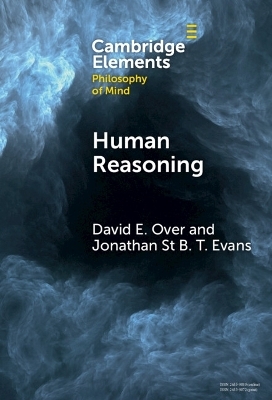
Human Reasoning
Seiten
2024
Cambridge University Press (Verlag)
978-1-009-49536-3 (ISBN)
Cambridge University Press (Verlag)
978-1-009-49536-3 (ISBN)
This Element is on new developments in the psychology of reasoning that raise or address philosophical questions. It discusses a new Bayesian paradigm that views ordinary human reasoning as mostly inferring probabilistic conclusions from degrees of beliefs. It also covers new formulations of dual-process theories of the mind.
This Element is on new developments in the psychology of reasoning that raise or address philosophical questions. In traditional studies in the psychology of reasoning, the focus was on inference from arbitrary assumptions and not at all from beliefs, and classical binary logic was presupposed as the only standard for human reasoning. But recently a new Bayesian paradigm has emerged in the discipline. This views ordinary human reasoning as mostly inferring probabilistic conclusions from degrees of beliefs, or from hypothetical premises relevant to a purpose at hand, and as often about revising or updating degrees of belief. This Element also covers new formulations of dual-process theories of the mind, stating that there are two types of mental processing, one rapid and intuitive and shared with other animals, and the other slow and reflective and more characteristic of human beings. The final topic covered is the new developments and rationality.
This Element is on new developments in the psychology of reasoning that raise or address philosophical questions. In traditional studies in the psychology of reasoning, the focus was on inference from arbitrary assumptions and not at all from beliefs, and classical binary logic was presupposed as the only standard for human reasoning. But recently a new Bayesian paradigm has emerged in the discipline. This views ordinary human reasoning as mostly inferring probabilistic conclusions from degrees of beliefs, or from hypothetical premises relevant to a purpose at hand, and as often about revising or updating degrees of belief. This Element also covers new formulations of dual-process theories of the mind, stating that there are two types of mental processing, one rapid and intuitive and shared with other animals, and the other slow and reflective and more characteristic of human beings. The final topic covered is the new developments and rationality.
1. Introduction; 2. Deductive reasoning; 3. Reasoning and probability; 4. Non-deductive reasoning; 5. Conditionals; 6. Dual processes in reasoning; 7. Rationality and reasoning; 8. Conclusions.
| Erscheinungsdatum | 10.08.2024 |
|---|---|
| Reihe/Serie | Elements in Philosophy of Mind |
| Zusatzinfo | Worked examples or Exercises |
| Verlagsort | Cambridge |
| Sprache | englisch |
| Gewicht | 255 g |
| Themenwelt | Geisteswissenschaften ► Philosophie ► Logik |
| Geisteswissenschaften ► Psychologie ► Allgemeine Psychologie | |
| Geisteswissenschaften ► Psychologie ► Verhaltenstherapie | |
| ISBN-10 | 1-009-49536-4 / 1009495364 |
| ISBN-13 | 978-1-009-49536-3 / 9781009495363 |
| Zustand | Neuware |
| Informationen gemäß Produktsicherheitsverordnung (GPSR) | |
| Haben Sie eine Frage zum Produkt? |
Mehr entdecken
aus dem Bereich
aus dem Bereich
ein Gegenentwurf zum kurzfristigen Denken : so werden wir zu den …
Buch | Hardcover (2023)
REDLINE (Verlag)
18,00 €


